God continues to guide refugee years after He saved her family from dangers at sea
By Susan Szalewski
Surrounded by thousands yet alone
Separated from her parents and most of her family, Kim Anh Nguyen tried to comfort her four little nieces and nephews snuggled next to her on a small fishing boat.
It was 1975, right after South Vietnam fell to communist forces. The young teen and her nieces and nephews were among a throng of terrified refugees who had crammed onto boats and made their way to international waters off the coast of Vietnam.
Nguyen and the children, however, found themselves alone on a vessel. They and other family members – along with a multitude of others fleeing from Vietnam – had tried to make their way to a large ship by hopping boat to boat toward the ship. Many of the boats had been tied together in the crowded sea to help the refugees reach the craft.
In the chaos, Nguyen’s family became scattered. The ship had taken on as many refugees as it could and had to leave.
Nguyen had taken hold of her nieces and nephews from another boat. They had reached out to their parents in a passing vessel but the parents couldn’t grab hold.
“So I came and grabbed them,” Nguyen recalled. “When things happen so fast, you don’t know, you just react.”
With no one on board to steer the boat, the girl just held on to the four children.
Then night came, and the young ones cried for their parents as waves pounded the little boat. They screamed for someone to help them. Eventually a woman approached on another boat and told them to jump aboard.
Nguyen pulled some clothes from a small homemade backpack and used them to tie the four children onto her, one in front, one in back and one on each side of her.
“I said, ‘You all hold on to me! Hold on to me! Hold on to me!’
“So I tied them with my shirt and I jumped over to her boat with the four kids around me.
I fell on the boat,” Nguyen said, “but I made it.
“I don’t know how I made it. I mean it was just scary … and you have no other choice. You just do whatever your heart was telling you to do.
“I couldn’t believe it because I get sick on the sea really bad,” Nguyen said. “I couldn’t eat. But when that time comes, you just automatically raise yourself up.”
Setting off from Vietnam, her family knew the voyage would be dangerous.
The United Nations has estimated that between 200,000 and 400,000 refugees died while trying to flee by boat because of drownings, storms, starvation, pirates and disease.
So Nguyen’s family prayed, with her mother holding up a Crucifix and an image of Our Mother of Perpetual Help – two of the few possessions they could bring with them on their boat, which held about 45 people, all family members and neighbors. Nguyen’s brother in the military had to stay behind, though.
“Pray, pray, pray,” her mother, Lien Thi Vu, urged all those on board. They prayed the rosary throughout their long first night at sea.
Perhaps miraculously, the entire group survived the weeks-long exodus, on sea and in refugee camps, before establishing homes in the United States. Nguyen’s brother in the military, who was imprisoned in Vietnam, joined his family in Omaha 15 years later.
Throughout their ordeal, Nguyen felt God guiding her and her family.
“It’s amazing how He led us through every step of it,” she said in a recent interview.
“We didn’t lose anyone in our family … including my brother who was reunited with us. Even those 15 years later, he made it.”
From 1975 to 1995, more than three million people fled the war-torn countries of Vietnam, Laos and Cambodia, with about a million settling in the United States, according to historians.
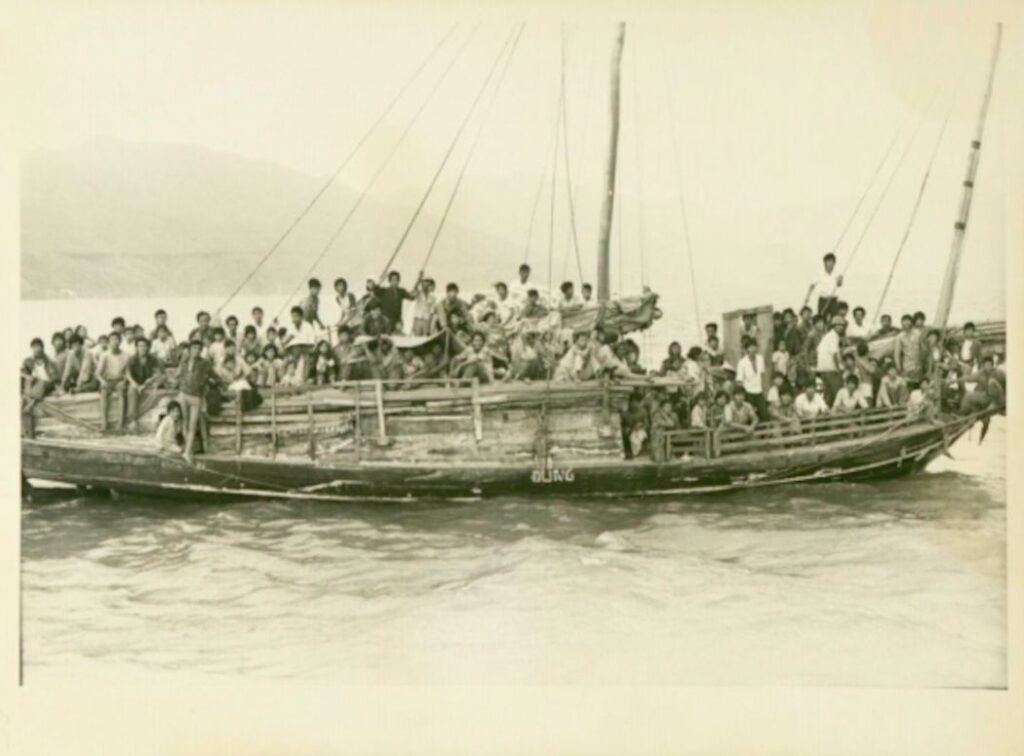
Refugees pack a boat in their escape from South Vietnam. U.S. NATIONAL ARCHIVES AND RECORDS
Some of those who settled in the Omaha area helped establish a Vietnamese parish – Our Lady of Fatima, which most recently has been established at St. Stanislaus Parish, historically the home of Polish immigrants.
Nguyen, secretary for Our Lady of Fatima, is among the more than 400 members of the parish along with her husband, Thanh Nguyen, and their adult daughter, Jennifer. The Nguyens help with many programs at the parish, including the delivery of Vietnamese food to parishioners and others.
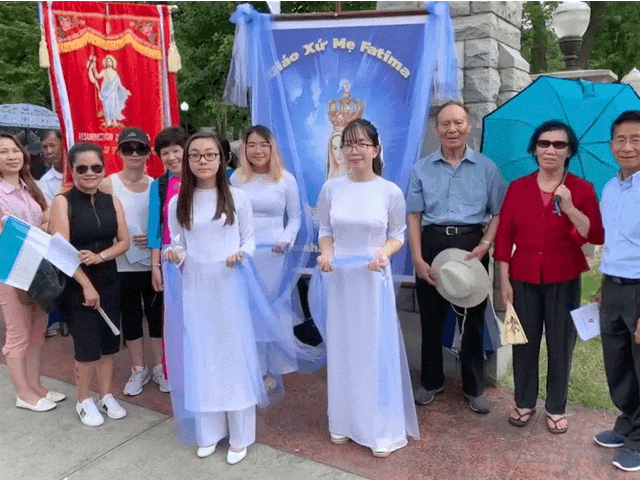
Members of Our Lady of Fatima Parish in Omaha. COURTESY PHOTO
Parish members keep Vietnamese culture and language alive in their activities, including Mass, sacraments, adoration, community rosaries, religious education and a youth group.
For Nguyen and older members of the parish, their Catholic faith was rooted in their native Vietnam. That faith has been tested through the Vietnam War and communist persecution, through their traumas as refugees and through adapting to new lives in a new country.
In Vietnam, Nguyen’s father, Tru Thiet Nguyen, tried to keep his children safe by keeping them in the dark about the unrest in Vietnam.
“He didn’t let us go to the movies,” his daughter said. “He didn’t let us go roller skate. He didn’t let us go out in public.
“He sent us to boarding school and would take us from boarding school back to home, and from home to church, and church to home. We couldn’t go to a restaurant or anywhere.
“I never understood why,” she said, “and he never explained until we came to the U.S. … He didn’t want us to get indoctrinated.”
Her family had been through suffering before.
A brother died in infancy, and a sister died at age 3. Those deaths were crushing for the family, Nguyen said. In leaving their bodies buried in Vietnam, “we felt like we left something behind.”
Nguyen’s father was chief of police in Vietnam’s Lâm Đồng Province in the country’s Central Highlands. He watched news and events that might indicate when it was time to leave the country.
He had his family move near the sea to be safe. He bought a boat and planned to move to Australia, the closest place of sanctuary to go to in a small boat.
Others in South Vietnam made similar plans.
“So when the president of Vietnam announced on the 30th of April that he gave up the country, that’s when all the boats took off,” Nguyen said.
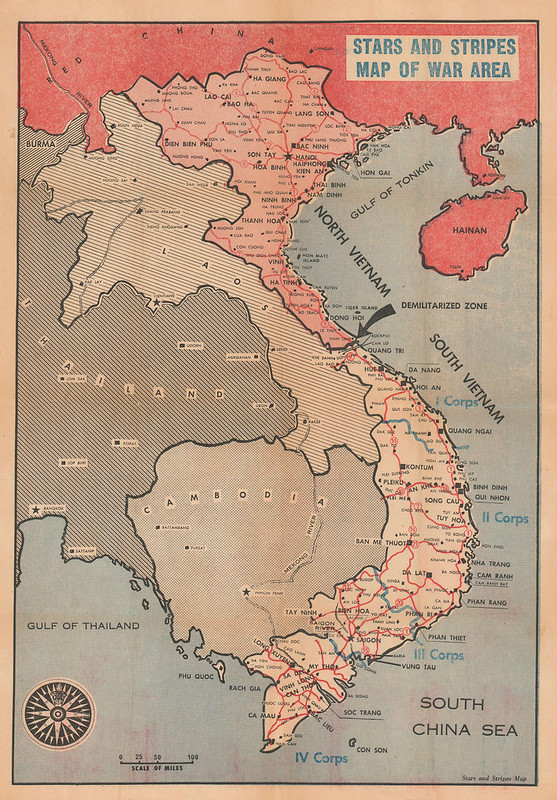
1966 map of the region
When communist forces entered their hometown of Bảo Lộc, Nguyen got in a car with her father and headed for Saigon, now known as Ho Chi Minh City, where the rest of the family had been for an event. The road to the city was blocked, so the father and daughter traveled on their boat on a river. From Saigon, the family headed to a seaport.
For much of her life, Nguyen said, she just wanted to feel at home. In Vietnam, she was sent to a boarding school and missed being home. Then after the South Vietnam surrender, “I’m thinking that I’m going away from my home again. And I don’t know what to think.”
Nguyen's mother later wrote about the family's former life in Vietnam and their escape.
"Leaving was very dangerous and very terrible," she said. "We were very nervous. My family had to separate three times on the sea. We jumped from one boat to another to find the way to the American ship and to find life. I saw people fall into the sea."
THE ESCAPE
On the family boat, her parents packed enough water, rice and wine for the possibility of a long voyage.
“We just tried to get away from Vietnam waters,” Kim Nguyen said. “So we went outside to the international waters.”
The person the family had hired to operate their boat left them and jumped toward the large rescue ship. So everyone else on the fishing boat did the same, leading to their separation.
The woman who rescued Nguyen and her nieces and nephews also picked up other stranded refugees, including her father and a sister.
The boat was so chock full that the passengers were just inches above the water. Nguyen and her sister sat at one end and had to dangle their legs in the sea to squeeze in. They used their hands to bail out water from the boat.
“I don’t know how many people” were aboard, Nguyen said. “It was dark.”
The engine had stopped working, so the boat just floated about. “We were so tired, so some of us just took a nap,” she said. “We were napping a little bit.”
Then, “with the sun shining in our eyes, we woke up. And there was a Philippines commercial ship right in front of us. And they invited us onto the ship.”
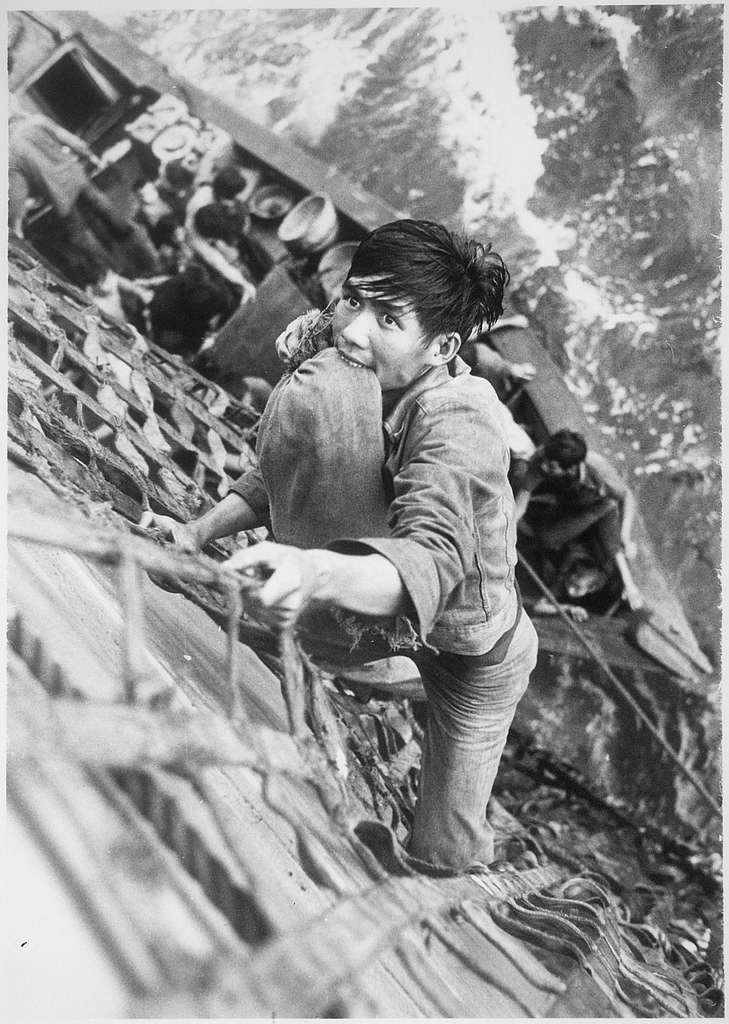
A refugee secures his belongings with his teeth as he climbs aboard a ship. U.S. NATIONAL ARCHIVES AND RECORDS
The ship took refugees from other boats until it was full and proceeded back to the Philippines. There the Vietnamese refugees stayed in a camp and were fed canned military rations.
Unsure about where their next meal would come from, many tried to save some of the opened canned food for the next day. But the food would go bad, and many got sick.
From the Philippines, Nguyen – and her father, sister, nieces and nephews – were flown to another camp in Guam. The Red Cross kept records there and tried to reunite refugees with other family members.
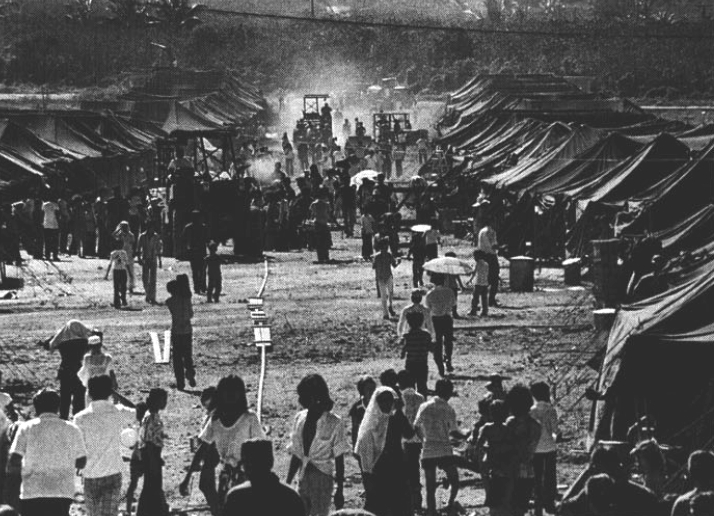
A Vietnamese refugee camp in Guam in 1975. U.S. NATIONAL ARCHIVES AND RECORDS
Nguyen said she prayed to see her mother again and had a dream in which they were both on boats that passed before each other on the sea. “Then she held my hand and said that this Wednesday we are going to see each other,” before both continued on in their vessels.
Nguyen told her sister about the dream and together they waited until late that Wednesday for an announcement from the Red Cross. But they went to sleep without hearing any news.
Later that night, though, they heard their father being called to the Red Cross. He returned to them saying that the mother and the rest of the family had been found.
“I didn’t see my mom that day,” Nguyen said, “but we received the news. So after that, they made the arrangement for my mom and the rest of the relatives to come to the camp with us.”
A week later, the family was reunited in Guam, each with their own harrowing stories of escape to tell.
SPREAD ACROSS THE UNITED STATES
From Guam, family members traveled to the United States, to another camp in Pennsylvania, until sponsors were found.
No single sponsor could take the big extended family, so they went to different destinations.
One sister and her family were placed in Rhode Island. Another older sister went to Florida. Another sister and her family landed in Norfolk, Nebraska, where a Missionary Benedictine sister sponsored them.
Nguyen and eight other family members – including her parents and a pregnant sister-in-law – settled in Omaha, sponsored by a group from St. Cecilia Parish.
A deacon, the late Joe Archibald, was the main contact and spent considerable time helping the family, taking them to English language classes, church, work, doctor and dentist appointments and more. He helped enroll the children in school and even gave driving lessons.
Once in Omaha, life got better, but the hardships didn’t end.
Her sister-in-law was about to deliver her baby, and her three younger sisters were all in school. As the oldest of the family’s children in Omaha, a lot of responsibility fell on Nguyen, who eventually was enrolled at the former Cathedral High School.
Her parents, in their 50s at the time, didn’t speak English and couldn’t communicate with anyone. “So everything had to go through me.”
She was learning English but often had to ask native speakers to please slow down so she could understand.
Nguyen’s young nieces and nephews were recommended for psychiatric help because of the trauma they had witnessed, Nguyen said.
At school, they had drawn pictures of people floating in the water, sometimes just a hat floating in the water, “because that’s what they saw,” their aunt said. “A lot of people died in the ocean. They saw people fall into the water. It was just a nightmare.”
Nguyen’s brother, who stayed in Vietnam and was imprisoned, eventually escaped to Malaysia and found his way to the United States and his family in Omaha. His daughter, who was not yet born when her mother left Vietnam, was a teenager by the time she first saw her father, and it took a while before she could accept him, Nguyen said.
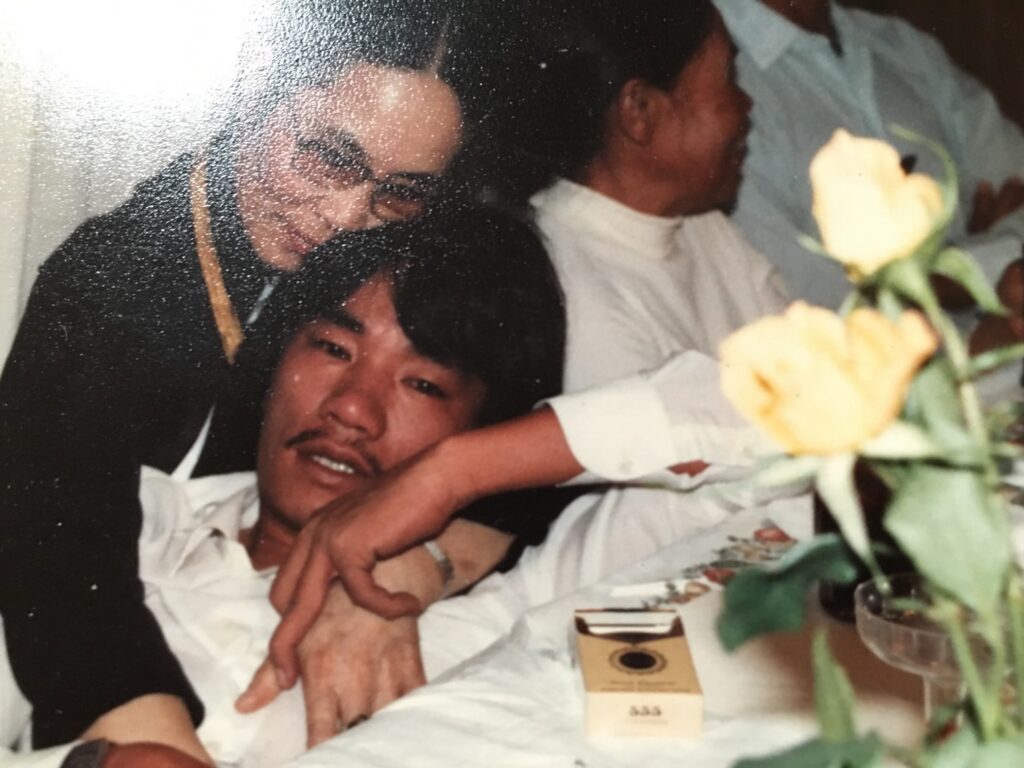
Nguyen's mother is reunited with her son, who served in the South Vietnam military and was imprisoned after the Vietnam War. COURTESY PHOTO
The teenage Nguyen helped Deacon Archibald at his work, and he taught her to drive and came to the rescue when the family’s used car broke down or they needed other assistance.
After graduating from Cathedral, Nguyen earned a degree in accounting from Creighton University and took additional computer classes.
Through the years, God continued to guide her in her work and helped her land jobs, she said.
Nguyen is now vice president of global business for International Nutrition Inc. in Omaha and helps sell animal products in about 15 countries.
On her first trip back to Vietnam – a business trip – during a stop in Hong Kong, Nguyen saw a small fishing boat similar to the boat her family had embarked on.
“I was just shaking, very emotional,” she said. “It brought back everything.”
Though traumatized, her family knows their many prayers were answered, Nguyen said, how they all survived their escape from Vietnam and how they were blessed with bright futures in the United States.
That journey that began nearly 50 years ago has strengthened her belief in God, she said.
“I experienced God’s help through all of that,” Nguyen said. “Because from one country to another, how did we manage to get to be here today?”
“How did I wake up and see what I needed to do without Him guiding me in my head?” Nguyen asked. “I see that in every step of my life, God’s helping me.”
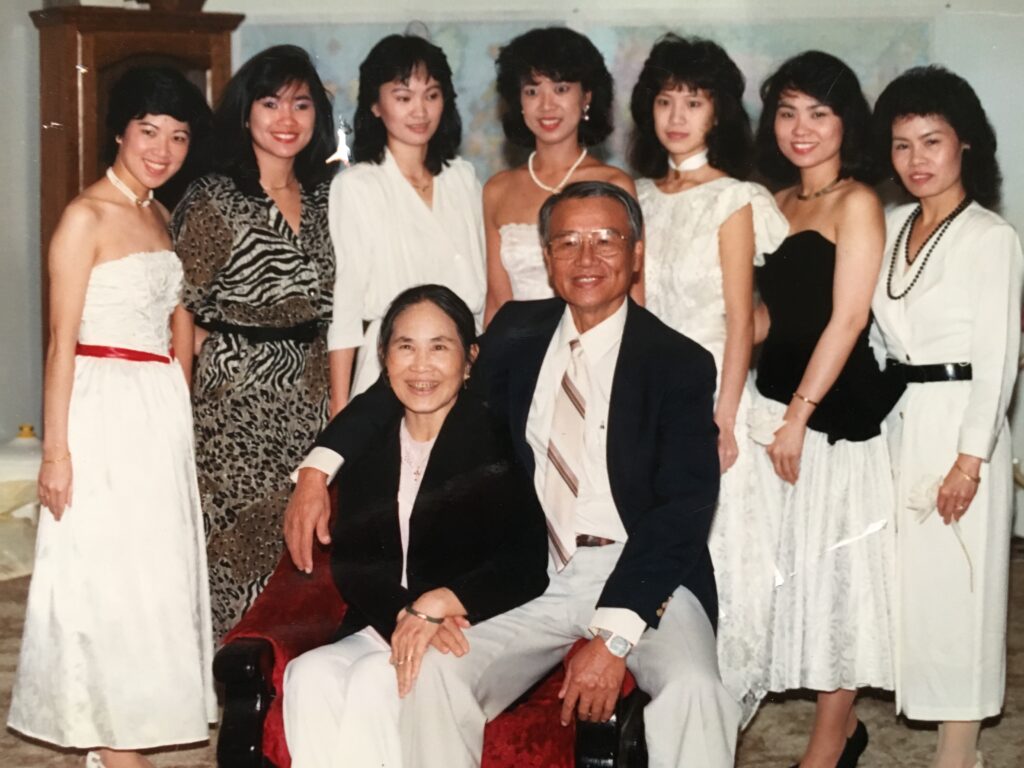
Kim Nguyen is pictured with her sisters and parents. She is at far left in the back row. COURTESY PHOTO
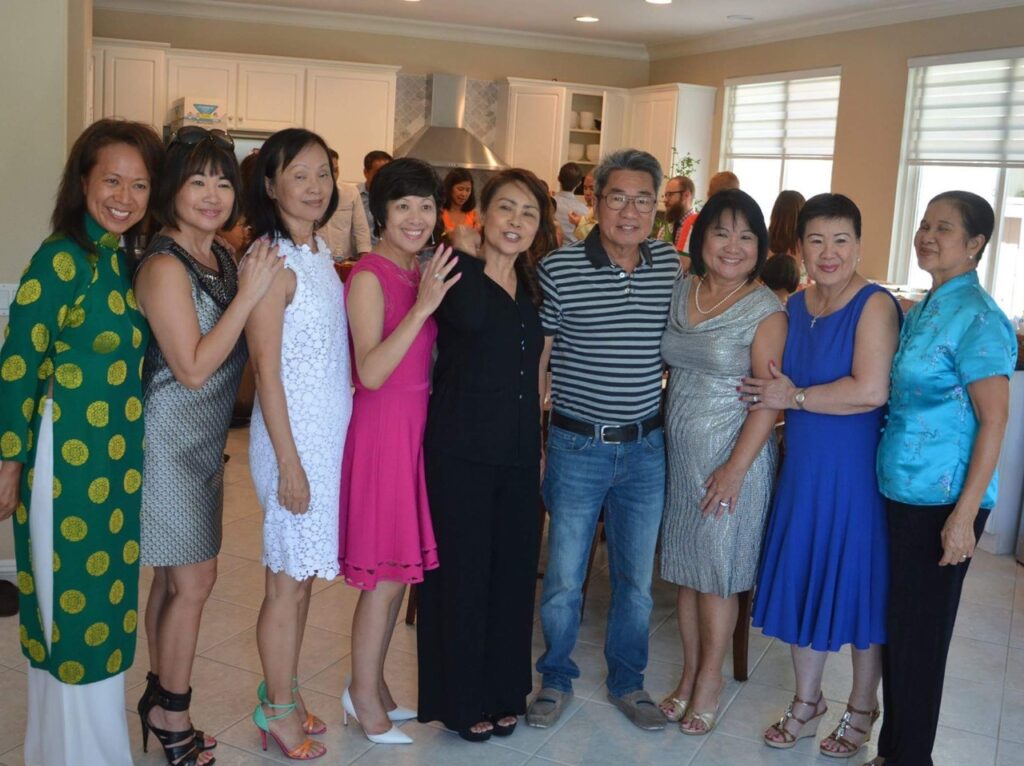
The siblings are pictured more recently. COURTESY PHOTO
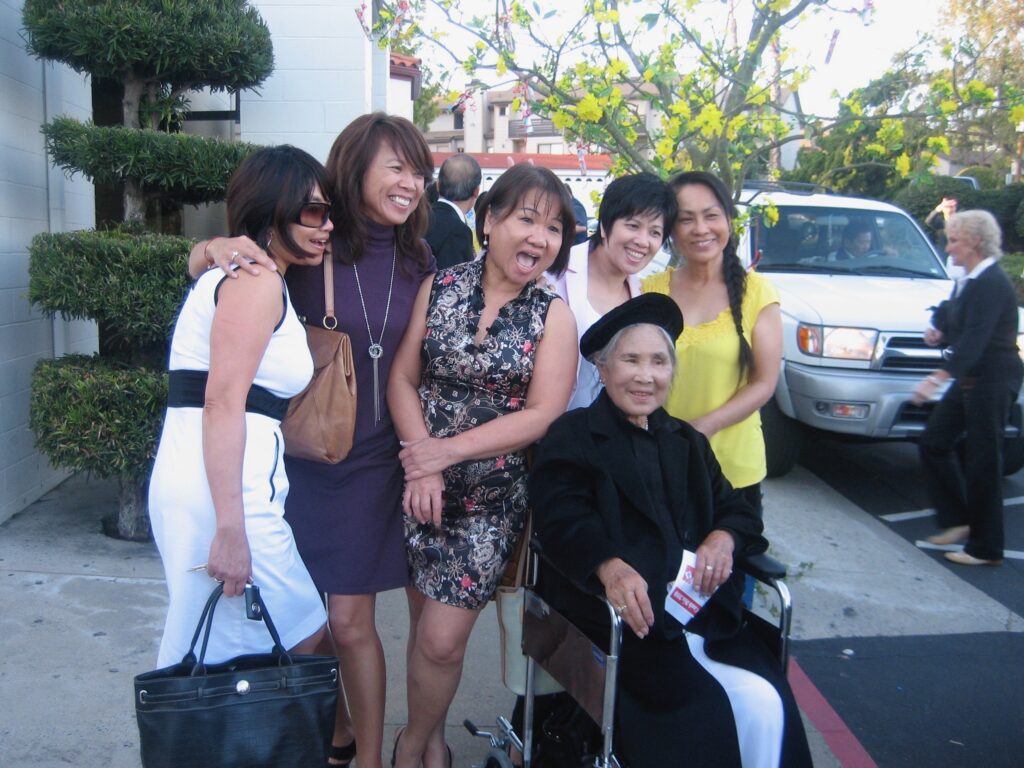
Nguyen and four of her sisters are shown with their mother, who lived in California before her death. COURTESY PHOTO